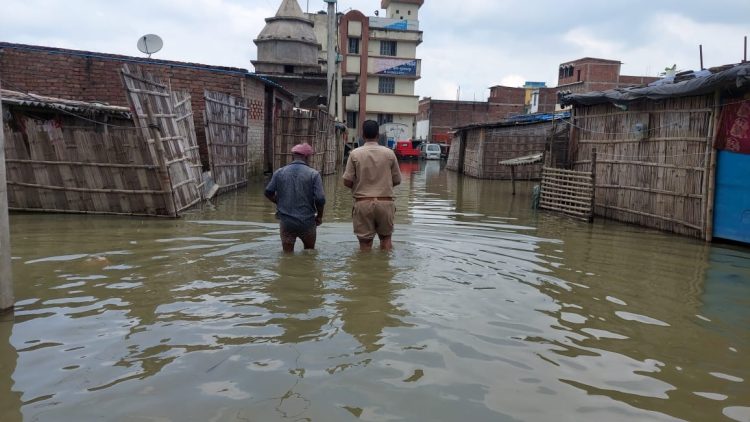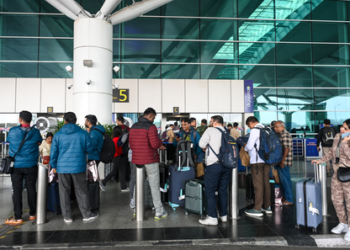Patna: The flood situation in North Bihar has worsened due to continuous rainfall over the past few days.
Ganga Rivers along with its tributaries are flowing above the danger level at several locations were exacerbated by heavy rainfall in the catchment areas of Nepal, leading to rising water levels in Bihar’s rivers.
Since September 26, heavy rains have hit most of the river catchment areas in Bihar and forecasts suggest rains will continue for the coming days.
The government has put all 38 districts in Bihar on alert, with varying intensities of rain expected across the region.
Districts like West Champaran, East Champaran, Sheohar, Sitamarhi, Supaul, Araria, Kishanganj, Purnia, Katihar, Gopalganj, Siwan, Bhagalpur, and Banka have already experienced significant rainfall, with some areas recording 205 mm of rain.
The data released by the Meteorological Department in Patna indicates that the situation is likely to worsen, raising concerns about severe flooding and the potential for widespread chaos across the state. The authorities are on high alert as the state braces for further challenges in managing the flood crisis.
In response to the worsening flood situation in North Bihar, the Water Resource Department has taken significant steps to manage the crisis.
On Friday, 6 lakh cusecs of water were released from the Valmikinagar Gandak Barrage. Additionally, 6.81 lakh cusecs of water are expected to be released from the Kosi Barrage in Virpur Block.
Sanjeev Kumar Mall, Principal Secretary of the Water Resource Department, has instructed officials to closely monitor the flood situation and implement security measures to protect embankments and ensure timely rescue operations.
“All executive engineers, junior engineers, and other officials have been asked to remain stationed at the embankments within their jurisdictions for the next 48 hours. Additionally, they have been asked to arrange flood control equipment such as sandbags to prevent soil erosion along riverbanks,” Mall said.
“To ensure full preparedness, all leaves for officers within the department have been cancelled, and round-the-clock vigilance has been mandated to safeguard vulnerable areas. This proactive approach aims to minimise the impact of the anticipated floods, ensuring the safety of both the infrastructure and the local population,” he said.
According to the Water Resource Department, the water levels of major rivers in Bihar are fluctuating, with several crossing the danger mark due to continuous rainfall.
The water level of the Ganga River, at Digha Ghat in Patna, was recorded at 86 cm which is below the danger mark but rainfall is expected to cause an increase.
At Hathidah, the Ganga is flowing 11 cm above the danger level. In Munger, the water level was 63 cm below the danger mark, while at Kahalgaon in Bhagalpur, it was 54 cm above the danger mark
The water level of the Gandak River, at Dumria Ghat in Gopalganj, was recorded at 57 cm below the danger mark, but it’s expected to rise by 38 cm by Sunday if 6 lakh cusec water is released from the Gandak Barrage.
Kosi River is flowing 84 cm above the danger level in Kursela of Katihar district.
In Sonakhan (Sitamarhi), the Bagmati is 8 cm above the danger level.
In Khagaria, the Burhi Gandak is 81 cm above the danger level.
Kamla Balan River, at Jay Nagar (Madhubani), is flowing 15 cm above the danger level.
(IANS)
















